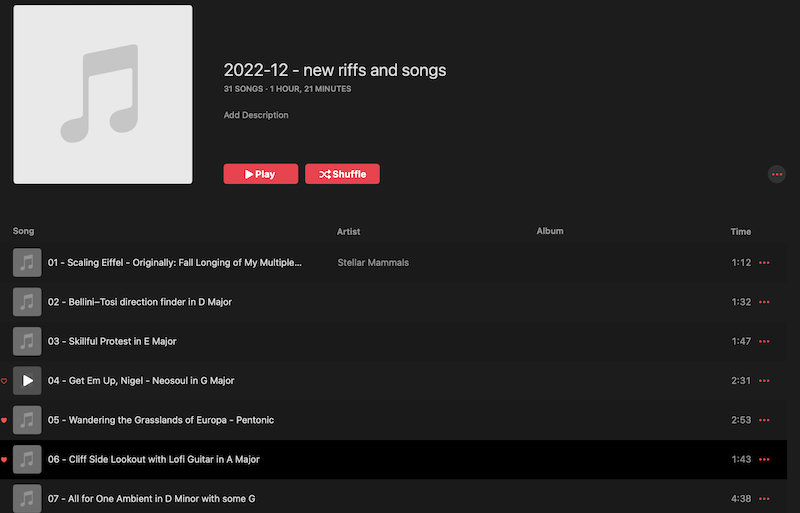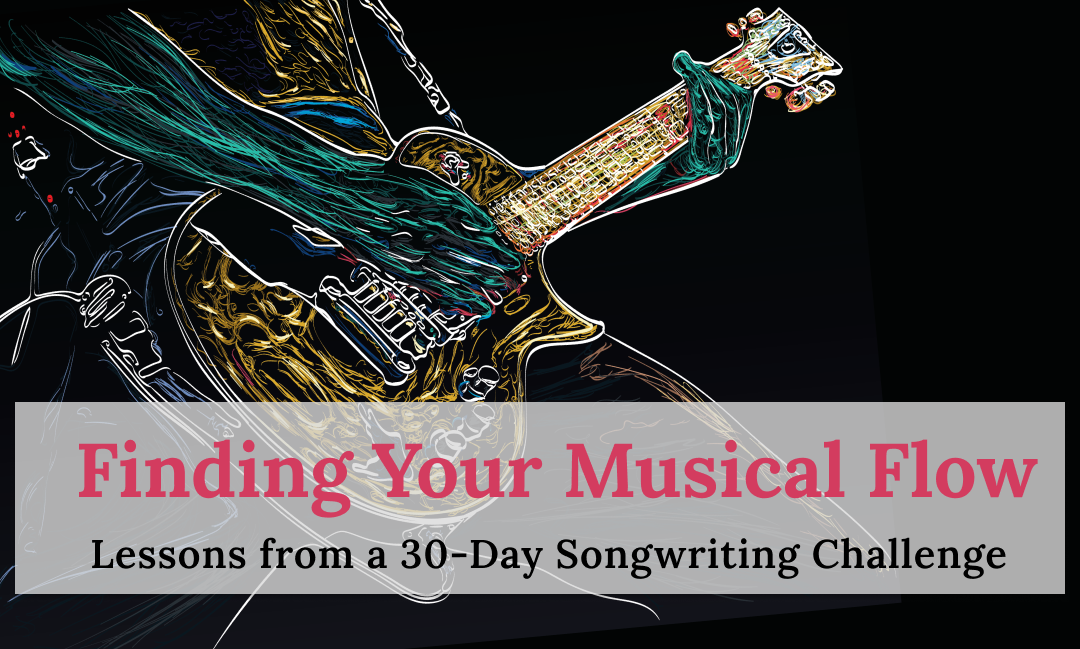Have you ever found yourself in a creative rut, struggling to find inspiration or motivation to create something new?
That’s exactly where I was as a music producer when I decided to challenge myself to write and produce a new song every day for 30 days straight. With my trusty DAW, a couple of templates, and a newly acquired collection of vintage instrument emulations, I embarked on a musical journey that would test my skills, challenge my creativity, and lead me down unexpected paths.
For 30 days, I woke up each morning with a mission: to start and finish a song demo by the time I went to bed at the end of the day. I had no set themes or genres in mind, and no expectations beyond simply showing up and making music. Some days were easier than others, but even on the toughest days, I found myself trying something and pushing through creative blocks to create something new.
As the days of the 30-day challenge progressed, I began to settle into a routine and find my groove. I experimented with different instruments, genres, and styles, and found myself drawn to the nostalgic sounds of vintage synthesizers and keys. Each day brought new challenges, whether it was balancing the demands of work and personal life with my daily musical commitment while overcoming creative ruts and self-doubt. But through it all, I discovered a renewed sense of purpose and a deeper love for the creative process. And I created a bunch of amazing songs, many of which were released on my latest album, Symbolic Wonderlands.
In this blog post, I share my experience during this multi-day music creation streak. Join me as I recount my 30-day songwriting music production challenge and share how it revitalized and transformed my approach to music-making, one day, one song at a time.
My Starting Point: Sparking a Streak of Creative Attempts
We’ve all been there struggling to actually show up for our creative pursuits. We have the passion, we’ve developed sufficient skills for, and we want to pursue this activity, but we just don’t end up following through and doing.
Having finished my first album at the end of Sept 2022, I had largely lost my interest in music production for awhile. I didn’t know what I wanted to learn next and I still felt a need to grow and improve as a producer. Caught up in travel and other personal and professional projects, I stopped making music regularly. I wasn’t learning much about music either.
As goal pursuers and learners, it’s not uncommon to feel a lull in our desire and ability to ship creative work. The high of achievement in writing, producing and releasing my first album was followed by uncertainty and disinterest. I didn’t want to make the same songs and album twice, but I didn’t yet know what I wanted to make next either. I had plenty of other things to occupy my time too, like reading and demanding professional projects.
I was feeling a bit down and demotivated in life and in my music. Faced with a combination of mental health challenges and professional job-related stress, I decided that my anecdote was a simple one: make new music every day. Inspired, I started a 30-day songwriting challenge. The underlying intention or “hack” was to trigger a bit of a behavior change. I was hoping to spark a daily routine of showing up and making a song. While I couldn’t really control whether I’d create songs worth finish or sharing, I’d at least have shown up and tried to create.
My Approach Getting Started and Finish a Month’s Worth of New Songs
Starting a new song can be daunting, especially when you’re not quite sure where to begin. For me, the key to getting started with this 30-day songwriting challenge was to keep things simple and remove any unnecessary barriers. Here are some of the strategies and tools I used to jumpstart my creativity and start making music every day.
1. Creating a dedicated workspace setup
During my day job as a product manager and marketer, I spend a good deal of time on my computer. While it would have been better having a dedicated space just for my music, this was not a practical solution in our living situation. So instead, I made my work space easily converable to start making music fast. Even though I rarely make music during the work day, during my month of making music I kept all of my key gear on hand. My audio interface was ready and my midi keyboards were on hand. This made it simple to shift from professional and client work to my music production.
Additionally I’m a big believer in shortcuts. I use a keystroke shortcut command to quickly close individual or all of my currently opened applications. This allowed me to clear my environment and palette of tools and transition into music mode. This meant that after ending my last work task of the day or returning from a workout or walk I could immediately switch into a creative mindset whenever I sat down to make music.
2. Start with a template
Another helpful strategy for getting started making music was to use a template in my DAW, Ableton Live. I created a basic “Piano Starter Template” that included a few MIDI tracks with different piano and keyboard sounds as well as some pre-made drum beats and my main bass. This allowed me to quickly start playing around with different chord progressions and melodies without having to spend a lot of time setting up each new track. Having a solid template to start with I was ready to go. In other words, I didn’t have to waste any time setting up my tracks, which gave me more time to focus on creating.
3. Experiment with different instruments and sounds
One of the most exciting and inspiring parts of the challenge was getting to experiment with different instruments and sounds. I had recently purchased Arturia’s V Collection, which includes emulations of classic synthesizers, keyboards, and other vintage instruments. It was wonderful to load up a new instrument and find incredible sounds. I found that playing around with these sounds often sparked new ideas and helped me break out of creative ruts. There were just so many cool sounds and inspiring instruments, I felt pulled to make something music.
4. Get into Flow.
One of the key ingredients for success in this 30-day songwriting challenge was getting into a state of flow. Flow is a psychological state of complete immersion in an activity, where you become so fully absorbed that time seems to fly by and you forget about everything else. It is a state of mind where creativity flourishes and you feel completely connected to the task at hand.
To get into flow, it’s important to eliminate distractions and create an environment that fosters creativity. You should an enviroment and setup that helps you stay singularly focused on your music production workflow. Most often, as I describe in my long blog post on the science of flow, flow comes from pursuing hard challenges. Experiment with different approaches until you find what works best for you. But remember the rule: if you got into flow, you likely have created an ideal case for high-quality creative output.
Once you’re in the flow state, try to stay there for as long as possible. Keep distractions to a minimum and stay fully immersed in the task at hand. Don’t worry about getting everything perfect on the first try – just let the musical ideas flow and focus on capturing quickly using your DAW. You’ll be surprised at how much progress you can make in a short amount of time when you’re in the flow state.
Getting into flow was a crucial part of my 30-day songwriting challenge and a huge driver to completing a song each and every day. Assuming all went well and I got into a state of flow, I was nearly always guaranteed with a decent song start.
5. Embrace imperfections
It’s easy to get caught up in trying to make everything perfect, especially when you’re working on music. Templates allow you to be sure the basic ingredients to cooking a good-sounding song are there. By letting yourself get into a flow state, using templates to minimize distractions, and focusing on creating without overthinking, you’ll find that you can make a lot of progress on a new song quickly.
Along with optimizing for flow, I quickly learned to embrace imperfections and focus on finding a single, strong music idea. The objective of these daily music riffs wasn’t a perfect song. Instead, the key was staying motivated and making progress in the moment and over time. Some of my favorite songs from the challenge started out as simple chord progressions or riffs that I recorded on the fly. I was just jamming. By allowing myself to experiment and make mistakes, I was able to uncover new ideas and create music that felt authentic and unique. It was good to experiment in “happy accidents” from time to time. I found that allowing myself to make mistakes and experiment actually helped me develop a unique sound and style.
6. Make it a habit to start AND to finish
Perhaps the most important strategy overall during this goal pursuit was to make it a habit. I set a daily goal of spending at least 15-30 minutes sitting down, clearing my desk, opening my template and trying to make a song. Regardless of everything else that seemed to call at my attention, I made sure to prioritize this daily time in my schedule each day. Most weekdays my music making fell sometime between 5 and 8pm. On the weekends, I often started with a bit of music making and sometimes made more than one track on such days. By treating my music production as a non-negotiable part of my routine, I was able to build momentum and stay motivated even on days when I didn’t feel particularly inspired. There was even a couple days where I nearly broke my streak of showing up but still found 20 minutes at the end to make something musical.
Tracking My Progress: From Time Commited to the Finished Product
So how did it go?
While I probably could have done a better job tracking my completed song demos and better monitoring my progress, this wasn’t my main objective. Ultimately, using simply the songs I rendered and dropped into Apply Music, it was clear that I had acheived my primary output goal and had made 31 songs in 31 days:

In terms of habit and behavior change, I showed up everyday for over one month and managed to make a song on basically every single day.
Over the course of one month, I carved out regular time to create music. In fact, according to my manual project time tracking logs (tracked using Toggl), I spent 62hours and 10 minutes making music in that month. I spent 54h 37minutes using Ableton Live and other audio editing tools, according to my passively tracked time usage (tracked using RescueTime).

As a comparison, the amount of time I spent on music production represented about 37% of my total project time. While the majority of my time was still spent on software design and development, my day job, as well and other financial, organizational and personal and professional projects, my music time was a significant creative outlet for time and energy. Put another way, 1/3 of my dedicated creative and learning energy and time was on my music. During my work day and in the evenings I often relistened to my recent tracks. This was a confirming act to keep up with the streatk and gave me fodder for next creation.
In terms of my monthly output during this month of music, I produced:
- 31+ songs
- 80+ minutes of produced music
- 5-7 genres
My favorite track of the month was The Maze, a song I released about a month ago and has become my most popular track on Spotify to date. The main music idea and sound is clear from the original demo. Additionally I ended up with several nostaglic sounding songs in form of reggae/dub, psychedelic delayed guitar and lofi beats. I even sang on few tracks just for the fun of it.
For a single month as a part-time music producer, this output represented a lot of new music. I need to improve my music production and management tracking but it’s impossible to ignore the huge productivity increase this represented to me. It felt amazing to be making music regularly, both in terms of daily flow doings and songs I could listen to and share afterwards. In end, I can also say my latest album wouldn’t have been the same without this month of music challenge.
Conclusion: Show Up Daily, Try, Get into Flow, Just Finish It Already

Even if practice doesn’t necessarly make perfect, there is no doubt that practice makes better. In my case, practice with music production meant showing up and doing the thing and creating music. Frankly the most important component to succeeding during my 30 songs in 30 days challenge was simplying show up every day and trying. It’s easy to get bogged down by music gear, perfectionism, FOMO of other artists or to give up when facing creative blocks, but by committing to a daily routine and pushing through obstacles, you can achieve amazing things.
Commiting to the creative habit and showing up with any creative hobby is a big part of the battle. If you can consistently show up and iterate, you will make music and you will get better at making music. If you create a good environment and prepare a seamless set of templates, you can get started fast and trigger flow almost immediately.
If I could offer a guiding light to any music creative, it is pursue and optimize for flow. Flow is the state of mind where you become fully immersed in an activity, lose track of time, and perform at your highest level. By setting aside a specific time each day for your music production and songwriting challenge, you can create the ideal conditions for flow to occur. And once you’re in the flow, you’ll be surprised at how easily the ideas and inspiration come to you. And, even better, you’ll get to welcome into the world a few new creative creations along the way.
Lastly, it’s important to challenge yourself to finish what you start. Ideally finish it into a state you can listen to later and share with others. It’s easy to get caught up in the idea of creating the perfect song, but sometimes it’s better to simply complete a song demo and move to making the next one. Finishing songs and perfectionism at this stage can hinder you from getting started, creating new songs and demos and ending a session satisfied. All of which can derail your progress and mindset. By setting a goal of finishing a song demo every day, you’ll be forced to let go of the need for perfection and focus on simply getting the job done.
In the end, my 30-day music production challenge was about much more than just creating a bunch of songs. It was about finding music creation meaningful and energizing again. It was about about starting and building a daily practice of creativity and perseverance, and learning to let go of overthinking and focus on doing now. Whether you’re a professional musician or just starting out, I highly recommend trying a challenge like this and see if it can help you grow as an artist and as a person. If I was able to jumpstart my creativity and start making music every day for 30 days straight, why can’t you?
Good luck and send me a note if you try and challenge and manage to make a new song or several!
About Me: I’m a lifelong learner who is self-taught and fluent in French and Chinese, computer programming, product design and digital marketing. I am a long-time advocate and practitioner for the quantified self and self-tracking in general. I write and blog regularly about technology and personal development on my blog www.markwk.com. You can check out my music on all streaming platforms as StellarMammals. If you are looking for a music collaborator or producer, contact me at stellarmammals@gmail.com.
Additional Topics and Readings: If you are interested in my music producer learning journey, check out my post Zero to Album. If you want to explore peak performance and flow, checkout Science of Flow. Finally, if you are interested in understanding more on goals and goal pursuit strategies, I recommend reading a post or two from my on-going blog series on the Science of Goals.
AIDA (AI Disclosure Acknowledgement): The following written content was generated by me with the assistance of an AI-based system (ChatGPT). Specifically I used it to help me in pre-writing phase, copyediting and minor re-writing and drafting a few individual points.>

